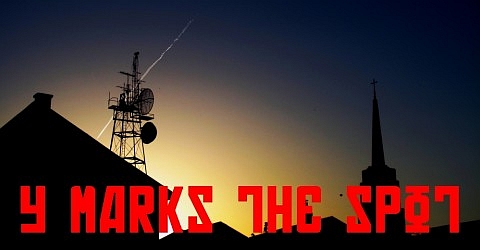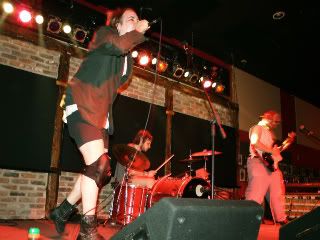Meklit Hadero sounds like a lot of things: a full-throated jazz pixie, a guitar folk whisperer, a cool and self-collected slinger of R&B. One thing she never sounds is boring, and I’d also throw in complacent into that mess of things Hadero is not. A lifelong traveler, the Ethiopian-born singer has collected a vast swath of styles, mixing them together into “On a Day like This,” an album released last year in which Hadero sings of setting roots in San Francisco.
But in talking with Meklit Hadero, one gets the strong impression that her musical ambitions – goals which are blatantly larger than sound – don’t begin and end with the recording of songs. Having formed an artistic group of fellow Ethiopians known as the Arba Minch Collective, Hadero has explored and challenged her roots with an intensity that is hard to match.
Y Spy: Let’s start with the basics. Who are you, and what is your musical background?
Meklit Hadero: I’m a vocalist and a songwriter originally from Ethiopia. I was born there and grew up all over the States: in Brooklyn and in Florida and in Seattle. I’ve been in San Francisco the past seven years. The music kind of sits at the crossroads of three different traditions: the American songwriters, jazz, as well as bringing in some Ethiopian music and influence. I primarily play with jazz instruments, plus I bring a lot of improvisation into the live shows.
Y Spy: How has traveling around internationally as well as within the United States affected your musical perspective?
Hadero: When people ask me what my influences are, I tend to think less about who are the artists that I model myself after and more about what the sounds are that I’ve absorbed growing up. For example, living in Brooklyn for six years, the place I grew up in my childhood years, jazz was everywhere. It was in the subways and in the streets. So was early hip-hop. That sort of soundscape, the streetscape, of New York felt like it was an important sonic ingredient. Then, of course, growing up and having my parents play old Ethiopian cassettes.
There was a constancy of sound as a presence in one’s life, and how those sounds then get interpreted as songs, and where they come out, is something of a mystery. But it does happen, and that was a big part of how I developed this particular approach to making music.
In terms of influences, though, I’d say that my biggest influences have been my voice teachers, people who taught me what the voice is and what its expressive power as an instrument is.
Y Spy: How did you put together On a Day like This?
Hadero: I wanted to make it as a tribute to my first five years in San Francisco, because at the time I wasn’t sure I was going to stay. I had just done a residency at the De Young Museum and was about to go to Oxford for a few weeks to do the TED Global Fellowship, and then I was going to travel for three months. I called it my cliff; I had no idea what was going to happen after this particular period of time.
It was just about two months before I left when I said: I have to make an album before I leave. I realized that I wanted to capture the period of time that had happened. So it was really about who I had been playing with for those five years of developing those songs, bringing together all these jazz musicians who I had played with and who were a big part of my musical community, but also bringing together a lot of musicians from a collective of classical artists called Classical Revolution that are all about changing the way classical is played, making it more accessible. They have chapters in ten or twelve cities, but they started in San Francisco a few blocks from my creative home at the Red Poppy Art House. That’s how I brought people together.
Y Spy: As you’ve said, On a Day like This mixes together a lot of styles. Was it difficult, considering this, to constrain all of these different directions to something as finite as an album?
Hadero: I have real faith in multiplicity. I feel like people have a lot of capacity for bringing together complexity than is offered in a lot of marketing. Nobody’s really one genre. It’s really hard to label anyone’s music. The best descriptions of music are poetic.
I never thought of it as limiting; I thought of it as a window.
Y Spy: Were there any styles that you do wish you had explored more on this album, or that you would like to explore more on a future release?
Hadero: I have a few releases coming out. I’m actually in the middle of two albums right now. Gabriel Teodros is a Seattle-based MC who, with Burntface and I, went to Ethiopia in May as part of this collective that travels there annually to connect with artists, traditional and contemporary. We just finished recording an album which we call our Ethiopian hip-hop space opera. So I’m working with two MCs, and it’s all with beats, and in it Gabriel is a half-alien, half-human coming to Earth for the first time. It’s a really theatrical, big production, and that will be out in January.
Also in January is a simultaneous release with an Oakland-based soul singer called Quinn Deveaux. We’re doing soul interpretations of indie rock and art rock songs, with a few originals on there too. Some David Byrne and Patti Smith, but really bringing the soul roots of that music to light through this collaboration.
I’ll continue to make the music that is interesting and inspiring to me, but I really don’t feel limited by style. Collaboration lets you grow in that way.
Y Spy: It seemed that in the old top-down musical model, musicians would release work every two years or so, but there wasn’t a whole lot of recording or outside activity inbetween. Do you feel like people are becoming more open to collaboration now, being that the terms aren’t so dictated from the top?
Hadero: That’s exactly what it is: the terms aren’t dictated from the top. We’re also in a place where nobody knows what works, so there are no rules. You might get pressures from all sorts of sides to be more defined and hyper-focused in your scope, but now nobody knows. So try something!
Part of what makes me empowered is my relationship with Porto Franco Records, the label I work with. They’re based in San Francisco, a father-son team, and they are ridiculously supportive. They’ve helped me make these records, and they really believe in their artists – and I think they believe in artists in general. That’s been a relationship that has made a lot of this possible.
Y Spy: What do your recent touring plans look like?
Hadero: As I mentioned, we were in Ethiopia and Kenya in May. I’ve been doing some summer touring; this particular tour starts in the Bay Area and winds all the way up the West Coast. I’m doing an East Coast tour in October, hopefully heading to Europe in November. But right now, aside from these short tours, I’m trying to finish up these albums and gear up for January. 2012 is going to be really tour intensive.
Y Spy: How did you go about gathering fellow Ethiopian musicians to form the Arba Minch Collective? Were these people you already knew or people you sought out?
Hadero: Kind of both. There was a website called habesha.com that came out in 2001. It started as a website to bring together Ethiopian-American and Eritrean-American artists. It was at the height of the tensions between Ethiopia and Eritrea. What they ended up doing was bringing together and finding Ethiopian-Americans, Ethiopian-Canadians, Eritreans, and artists in diaspora. They started writing about them, they started compiling lists, and suddenly there was a place where you could find out what all these people were doing all over the world. It kind of underlined this emerging generation. On Myspace you started finding out about people, and then there started being conferences where people would get together.
This network of artists who were doing work that I really loved, that I had been paying attention to for quite a while, I started meeting them when I started performing a lot. There was an awareness, you would say. What happened was that I found out about something called the 1,000 Stars Festival that brought together 56 ethnic groups from the south of Ethiopia to play their music together. They’re distinct ethnic groups with different cultures, different music, different food even, and they came together in this festival and danced and sang for three days, for 50,000 people from Ethiopia. I thought: I had to go, but how much more powerful would it be if it wasn’t just me that goes, but a whole generation that’s in this process of defining itself and could really benefit and learn from going to this? So the group started for a particular experience. The festival was cancelled, and we went anyway and had an amazing time traveling throughout the country and connecting with a burgeoning artistic movement. Our first trip was in December 2009, and our second trip was this past May, and we will continue to make annual trips.
Y Spy: In America, culture seems relatively formless and changing, taking connections for granted. What is the importance to you of having these connections with artists from your homeland?
Hadero: In a way, it’s about reality. What I realized is that, growing up in the States, my whole experience of Ethiopian culture was filtered through my family lens. There were the stories that I would hear, experiences that particular people would have, but that’s such a small part of this grand picture of culture. What I realized is that things are changing there, fast. They’re changing extremely fast. Every time I go to Ethiopia, it looks different. Infrastructure is growing so fast, and I think it’s also in a process where there are huge pressures happening, too. If I really wanted to understand what was happening, I couldn’t rely on these filters. I’d have to go, but I had to go again, and again, and again, in order to have an accurate picture. If I ask myself why, my tendency is to answer with almost intuition – because I have to know, because I have to learn.
Y Spy: How does that compare with the artistic connections and your perspectives about and with America?
Hadero: I read in the New York Times, ten years ago, that 70 percent of New Yorkers are foreign born. That blew my mind! For me growing up there, that was the norm. Diaspora was the norm. I know it’s not like that all over, and borders are real, and contested, and challenging. But we also live in a place of multiplicity, and we can’t deny that. That’s what the world is like, and if we want to prepare ourselves for interacting with the whole world, we kind of have to be a little bit curious. And music reflects your times.
Meklit Hadero will play the EMP Level 3 Stage at Seattle’s Bumbershoot Festival at 9 pm on Saturday, September 3rd. Her album, “On a Day like This,” is available now.





